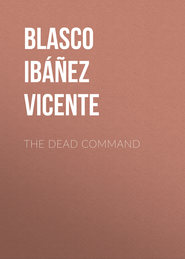По всем вопросам обращайтесь на: info@litportal.ru
(©) 2003-2024.
✖
Woman Triumphant (La Maja Desnuda)
Настройки чтения
Размер шрифта
Высота строк
Поля
"We are getting old, master," she said with feigned sadness, excluding herself from old age, loading the whole burden of years on her companion.
Renovales turned toward her in a final outburst of protest.
"Why should I not be as happy as that boy? Haven't I a right to it? Concha, you do not know who I am; you forget it, accustomed as you are to treat me like a child. I am Renovales, the painter, the famous master. I am known all over the world."
And he spoke of his fame with brutal indelicacy, growing more and more irritated at her coldness, displaying his renown like a mantle of light that should blind women and make them fall at his feet. And a man like him had to submit to being put off for that simpleton of a doctor?
The countess smiled with pity. Her eyes, too, revealed a sort of compassion. The fool! The child! How absurd men of talent were!
"Yes, you are a great man, master. That is why I am proud of your friendship. I even admit that it gives me some importance. I like you. I feel admiration for you."
"No, not admiration, Concha, love! To belong to each other! Complete love."
She continued to laugh.
"Oh, my boy; Love!"
Her eyes seemed to speak to him ironically. Love does not distinguish talents; it is ignorant and therefore boasts of its blindness. It only perceives the fragrance of youth, of life in its flower.
"We shall be friends, Mariano, friends and nothing more. You will grow accustomed to it and find our affection dear. Don't be material; it doesn't seem as if you were an artist. Idealism, master, that is what you need."
And she continued to talk to him from the heights of her pity, until they parted near the place where her carriage was waiting for her.
"Friends, Mariano, nothing more than friends, but true friends."
When Concha had gone, Renovales walked in the shadows of the twilight, gesticulating and clenching his fists, until he left Moncloa. Finding himself alone, he was again filled with wrath and insulted the countess mentally, now that he was free from the loving subjection that he suffered in her presence. How she amused herself with him! How his friends would laugh to see him helplessly submissive to that woman who had belonged to so many! His pride made him insist on conquering her, at any cost, even of humiliation and brutality. It was an affair of honor to make her his, even if it were only once, and then to take revenge by repelling her, throwing her at his feet, and saying with a sovereign air, "That is what I do to people who resist me."
But then he realized his weakness. He would always be beaten by that woman who looked at him coldly, who never lost her calm and considered him an inferior being. His dejection made him think of his family, of his sick wife, and the duties that bound him to her, and he felt the bitter joy of the man who sacrifices himself, taking up his cross.
His mind was made up. He would flee from the woman. He would not see her again.
III
And he did not see her; he did not see her for two days. But on the third there came a letter in a long blue envelope scented with a perfume that made him tremble.
The countess complained of his absence in affectionate terms. She needed to see him, she had many things to tell him. A real love-letter which the artist hastened to hide, for fear that if any one read it, he would suspect what was not yet true.
Renovales was indignant.
"I will go to see her," he said to himself, walking up and down the studio. "But it will be only to give her a piece of my mind, and have done with her once and for all. If she thinks she is going to play with me, she is mistaken; she doesn't know that, when I want to be, I am like stone."
Poor master! While in one corner of his mind he was formulating this cruel determination to be a man of stone, in the other a sweet voice was murmuring seductively:
"Go quickly, take advantage of the opportunity. Perhaps she has repented. She is waiting for you; she is going to be yours."
And the artist hastened to the countess's anxiously. Nothing. She complained of his absence with affected sadness. She liked him so much! She needed to see him, she could not have any peace as long as she felt that he was offended with her on account of the other afternoon. And they spent nearly two hours together in the private room she used as an office, until at the end of the afternoon the serious friends of the countess began to arrive, her coterie of mute worshipers and last of all Monteverde with the calm of a man who has nothing to fear.
The painter left the house. Nothing out of the ordinary had happened except that he had twice kissed the countess's hand; the conventional caress and nothing more. Whenever he tried to go farther, moving his lips along her arm, she checked him imperiously.
"I shall be angry, master, and not receive you any more alone! You are not keeping the agreement!"
Renovales protested. They had not made any agreement; but Concha managed to calm him instantly by asking about Milita, praising her beauty, inquiring for poor Josephina, so good, so lovable, showing great concern for her health and promising to call on her soon. And the master was restrained, tormented by remorse, not daring to make any new advances, until his discomfort had disappeared.
He continued to visit the countess, as before. He felt that he must see her; he had grown accustomed to her enthusiastic praise of his artistic merits.
Sometimes the impetuous nature of his youthful days awakened and he longed to rid himself of this shameful chain. The woman had bewitched him; she sent for him without any reason, she seemed to delight in making him suffer, she needed him for a plaything. She spoke of Monteverde and their love with quiet cynicism, as if the doctor were her husband. She had to confide the secrets of her life to some one, with that imperious naïveté that forces the guilty to confess. Little by little she let the master into the secret of her passion, telling him unblushingly of the most intimate details of their meetings, which were often in her own house. They took advantage of the blindness of the count, who seemed almost stunned by his failure to receive the Fleece; they took a morbid delight in the danger of being surprised.
"I tell you this, Mariano, I don't know why it is I feel as I do toward you; I like you as a brother. No, not as a brother, rather as a confidential woman friend."
When Renovales was alone, he despised Concha's frankness. It was just as people believed; she was very attractive, very pretty, but absolutely lacking in scruples. As for himself, he heaped insults on himself in the slang of his Bohemian days, comparing himself with all the horned animals he could think of.
"I won't go there again. It's disgraceful. A pretty part you are playing, master!"
But he had hardly been absent two days when Marie, the Countess's French maid, appeared with the scented letter, or it arrived in the mail, where it stood out scandalously among the other envelopes of the master's correspondence.
"Curse that woman!" exclaimed Renovales, hastening to hide the showy note. "What a lack of prudence. One of these fine days, Josephina will discover these letters."
Cotoner, in his blind devotion to his idol whom he considered irresistible, supposed that the Alberca woman was madly in love with the master and shook his head sadly.
"This will have a bad end, Mariano. You ought to break with her. The peace of your home! You are piling up trouble for yourself."
The letters were always alike; endless complaints at his short absences. "Cher maître, I could not sleep last night, thinking of you," and she ended with "Your admirer and good friend, Coquillerosse," a nom de guerre she had adopted for her correspondence with the artist.
She wrote in a disordered style, at unusual hours, just as her fancy and her abnormal nervous system prompted. Sometimes she dated her letter at three in the morning, she could not sleep, got out of bed and to pass the sleepless hours filled four sheets of paper (with the facility of despair) in her fine hand, addressed to her good friend, talking to him of the count, of what her acquaintances said, telling him the latest gossip about the Court, lamenting the doctor's coldness. At other times, there were only four brief, desperate lines. "Come at once, dear Mariano. A very urgent matter."
And the master, leaving his tasks early in the morning, ran to the countess' house, where she received him still in bed in her fragrant chamber which the gentleman with honorary crosses had not entered for many years.
The painter came in in great anxiety, disturbed at the possibility of some terrible event, and Concha, tossing about between the embroidered sheets, tucking in the golden wisps of hair that escaped from her lace cap, talked and talked, as incoherently as a bird sings, as if the silence of the night had hopelessly confused her ideas. A great idea had occurred to her; during her sleep she had thought out an absolutely original scientific theory that would delight Monteverde. And she explained it earnestly to the master, who nodded his approval without understanding a word, thinking it was a pity to see such an attractive mouth uttering such follies.
At other times she would talk to him about the speech she was preparing for a fair of the Woman's Association, the magnum opus of her presidency; and drawing her ivory arms from under the sheet with a calmness that dazed Renovales, she would pick up from the nearby table some sheets of paper scribbled with pencil, and ask her friend to tell her who was the greatest painter in the world, for she had left a blank to fill in with this name.
After an hour of incessant chatter while the artist watched her silently with greedy eyes, he finally came to the urgent matter, the desperate summons that had made the master leave his work. It was always an affair of life or death, compromises in which her honor was at stake. Sometimes she wanted him to paint some little thing on the fan of a foreign lady who was eager to take away from Spain some souvenir of the great master. The person in question had asked her at a diplomatic soirée the night before, knowing her friendship with Renovales. Or she had sent for him to ask him for some little sketch, a daub, any one of the little things that lay in the corner of his studio for a bazaar of the Association for the Benefit of Fallen Women, whom the countess and her friends were very eager to rescue.
"Don't put on such a wry face, master, don't be stingy. You must expect to sacrifice something for friendship. Everybody thinks that I have great power over the famous artist, and they ask me favors and are constantly getting me into difficulty. They don't know you, they don't realize how perverse, how rebellious you are, you horrid man!"
And she let him kiss her hand, smiling condescendingly. But as she felt the touch of his lips and his beard on her arm she struggled to free herself, half-laughing, half-trembling.
"Let me go, Mariano! I'll scream! I'll call Marie! I won't receive you again in my bedroom. You aren't worthy of being trusted. Quiet, master, or I'll tell Josephina everything."
Sometimes when Renovales came, full of alarm at her summons, he found her pale, with dark circles under her eyes, as if she had spent the night weeping. When she saw the master her tears began to flow again. It was pique, deep pain at Monteverde's coldness. He passed whole days without seeing her; he even went so far as to say that women are a hindrance to serious study. Oh, these scholars! And she, madly devoted to him, submissive as a slave, putting up with his whimsical moods, worshiping him with that ardent passion of a woman who is older than her lover and appreciates her own inferiority!
"Oh, Renovales. Never fall in love. It is hell. You do not know the happiness you enjoy in not understanding these things."
But the master, indifferent to her tears, enraged by her confidences, walked up and down gesticulating, just as if he were in his studio, and he spoke to the countess with brutal frankness, as he would to a woman who had revealed all her secrets and weaknesses. What difference did all that make to him? Had she sent for him to tell him such stuff? She grieved with childish sighs from the bed. She was alone in the world, she was very unhappy. The master was her only friend; he was her father, her brother. To whom could she tell her troubles if not to him? And taking courage at the painter's silence who finally was moved by her tears, she recovered her boldness and expressed her wish. He must go to Monteverde, give him a good, heart-to-heart lecture, so that he would be good and not make her suffer. The doctor respected him highly; he was one of his greatest admirers; she was certain that a few words of the master would be enough to bring him back like a lamb. He must show him that she was not alone, that she had some one to defend her, that no one could make sport of her with impunity.
But before she finished her request, the painter was walking around the bed waving his arms, cursing in the violence of his excitement.
"That's the last straw! One of these days you'll be asking me to shine his boots. Are you mad, woman? What are you thinking of? You have enough accommodating people already in the count. Don't drag me into it!"















